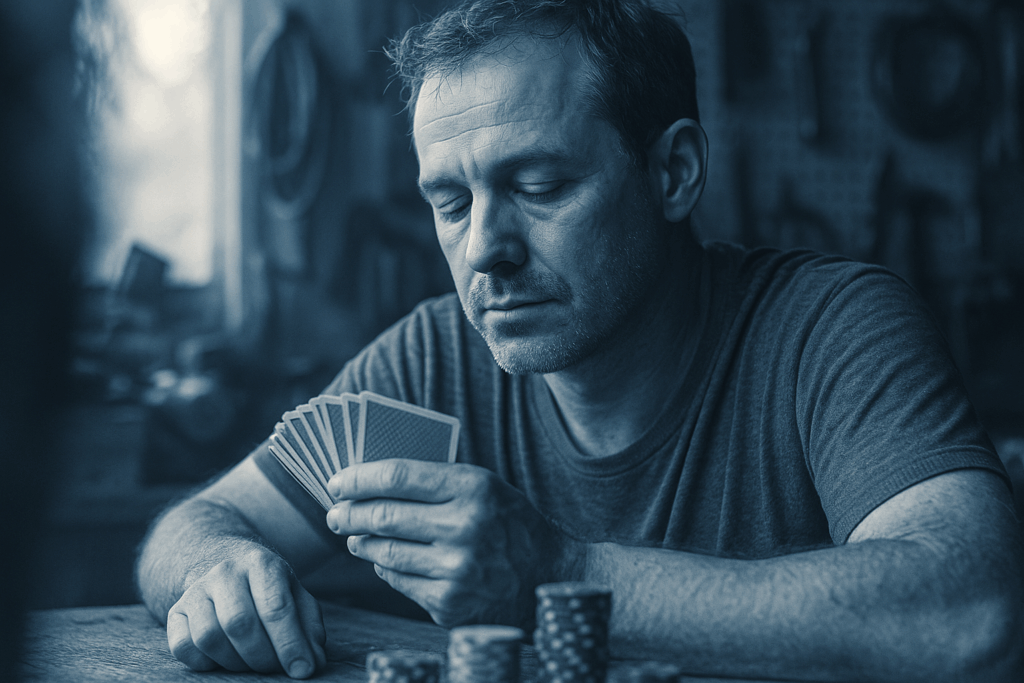Why Relaxation Matters at the Tables (or on the Screen)
Most gamblers focus on odds, bankrolls, and game mechanics. Few pay attention to the mental gear they bring to the table. That’s a mistake. Stress doesn’t just make you uncomfortable—it distorts your thinking. It shortens your patience, fuels impulsive moves, and clouds your ability to read situations clearly.
The truth is, you’re not just playing the game—you’re also battling your own tension. And the longer the session goes, the more that pressure builds. Without a plan to stay calm, discipline starts to slip. Tilt arrives faster. Mistakes multiply.
Smart players know this. They train their minds the way others train their game. Not for peace or joy, necessarily, but for grit—smoother focus, fewer emotional swings, and a higher chance of staying sharp through long hours. The goal isn’t Zen; it’s control. If you want to last—and win—relaxation isn’t optional. It’s part of your edge.
Technique 1: Focused Breathing to Keep You Present
Before the cards hit the table—or your screen boots up—your breath is your anchor. Simple, focused breathing is one of the most overlooked tools for staying calm, sharp, and centered. You don’t need candles or spa music. You just need a chair and 60 seconds.
Before play, try a basic box breathing drill: Inhale for 4 seconds, hold for 4, exhale for 4, hold for 4. Repeat 4 times. That’s one minute. It slows your heart rate, clears your head, and brings you into the moment. Mid-session and feeling the heat? Step back (mentally or literally), run that same pattern. You’ll feel the pressure drop—along with the urge to go tilt or chase.
Why it works is simple. When you’re stressed, your breathing shortens. Your decisions follow. You start reacting instead of thinking. Breathwork neutralizes that impulse. It slows down time just enough for logic to take the wheel again.
You don’t have to be a monk. But you do need to breathe like one when the stakes rise.
Technique 2: Muscular Relaxation for Physical Reset
You probably don’t notice it, but tension creeps in when you play. Shoulders rise toward your ears. Your jaw tightens. Hands grip the mouse or chips just a little too hard. It doesn’t matter if you’re playing online or at a live table—stress starts in the body before it hits the mind.
The fix? Systematic, deliberate muscle relaxation. Start by bringing awareness to where you’re holding tension. Take a moment to scan your body. During long sessions, this simple scan helps you catch the physical signs before they spiral into mental fatigue.
Next, spend ten focused minutes on progressive muscle relaxation. That means working through major muscle groups—tensing them briefly, then releasing. Start at your feet or your forehead, whichever feels best, and move through your body like a slow reset. It may sound basic, but this is old-school recovery tech used by elite athletes and high-performers across the board.
Why does this matter? Physical tension burns energy. It keeps your nervous system fired up even when you think you’re calm. And over time, that steady low-grade stress chips away at your focus and decision-making. Relax the muscles, and your brain follows. It’s not magic. It’s maintenance.
Technique 3: Break Strategy That Actually Works
Most players grind way too long without walking away. That’s a fast track to mental fog, tilt, and bad decisions. A smart break strategy isn’t just about stepping away—it’s about when and how you do it.
In general, aim for a quick micro-break every 30–45 minutes. That’s enough to reset your focus without losing momentum. We’re talking 90 seconds to 3 minutes—stretch, breathe, shut your eyes. Do not reach for the phone to scroll. That’s just swapping one dopamine loop for another.
Every few hours, take a full reset. Fifteen to thirty minutes, screens off. Go outside, walk, grab water, or hit a full-body stretch. This is the time to flush out stress and re-enter the session with a clear head. If you’re playing a long session, schedule these in. Waiting until you “feel” burned out usually means you’ve waited too long.
The combo that works: short breaks to stay sharp + long breaks to fully reset. Gambling well takes stamina—treat it like a marathon, not a sprint. Recovery isn’t optional. It’s part of the edge.
Technique 4: The Role of Environment
Your setup isn’t just about ergonomics—it’s about performance. The wrong lighting or a cluttered desk can agitate you before a single hand is dealt. Harsh overhead lights? Distracting. Blasting music or noisy surroundings? Instant tension. A calm environment doesn’t happen by accident—you create it.
Start with sound: soft background noise, white noise, or complete silence. Find what grounds you and stick with it. Lighting matters more than you think—natural is best, soft lamps are second. And posture? If your back’s aching ten minutes in, your focus won’t last thirty. Use a decent chair, and position your screen at eye level.
Cut the clutter—physically and digitally. Mute unnecessary tabs. Ditch the to-do list sitting on your desk. Every distraction siphons off focus, and in gambling, focus equals better decisions. Your space should feel like a low-stakes zone, not a war room. When your setup supports calm, everything else becomes easier to control.
Technique 5: Mental Conditioning
Strong gambling performance isn’t just about odds and strategy—it’s also about mindset. Mental conditioning is how you prepare and recover psychologically from sessions, and it can help you maintain composure, reduce emotional swings, and build long-term consistency.
Pre-Session Visualization
Got a tough session ahead? Prime your mind before the first hand is dealt.
- Close your eyes and take a few deep breaths.
- Visualize yourself staying calm, making careful decisions, and adapting to various outcomes.
- Picture a successful session—one where you feel in control, not just focused on winning.
This quick mental rehearsal can help you enter games with clarity instead of anxiety.
Post-Game Journaling
What happens after the session is just as important as what happens during it. Reflecting helps identify patterns and emotional triggers.
- Record how you felt before, during, and after the game.
- Note any impulsive moves and what preceded them.
- Track physical or emotional shifts to catch early signs of tilt.
Bonus: Over time, your journal becomes a personal playbook, showing you what works—and what doesn’t.
Treat Mindset Like a Skill
Professional gamblers know: mental preparation is part of the job.
- It’s not a “nice-to-have”—it’s a competitive edge.
- Like bankroll management, mindset needs regular attention.
- Top players build routines that sharpen focus, defuse stress, and boost recovery.
By incorporating mental tools like visualization and post-session reflection, you’re training your brain for success, not just surviving the variance.
Pro Tip: Build a Full Wellness Routine That Supports Play
The best gamblers don’t just prep for hands—they prep for the whole session. That starts outside the game, one small habit at a time. Eat real food. Drink water. Move your body. These aren’t wellness clichés—they’re core tools in your mental arsenal. A foggy brain leads to sloppy decisions. Poor sleep and bad posture show up in your plays whether you notice or not.
You don’t need a lifestyle overhaul. Just consistency. A walk before grinding. A solid breakfast. A bottle of water on your desk. Each move might feel small, but the compounding effect is real. Over time, you’re sharper, calmer, more durable. That’s what gives you an edge that swings profit your way.
Want to go deeper? Check out Building a Wellness Routine for Gamblers.
Final Word: Stay Sharp, Stay Relaxed
Gambling under stress is like driving drowsy—when your brain’s foggy, your edge disappears. You miss details. You push when you should fold. You chase losses because the pressure feels personal. It’s not just unwise—it’s reckless. Winning isn’t about guts, it’s about clarity. And stress muddies the waters fast.
This is where people get it twisted: discipline doesn’t start with your bankroll. It starts with your mind. A calm, present mind makes better decisions—plain and simple. Bankroll management is just paperwork if your head’s in chaos. Reset your body, slow your breathing, take your damn break. That’s the real discipline.
And here’s the kicker—mastering relaxation isn’t some soft, self-care gimmick. It’s a competitive advantage. The sharper, calmer player will win more over time. Not because they’re lucky—because they’re in control. Focus isn’t free, but it’s trainable. So treat calm like skill, build it daily, and bring it to the table every single time.


 Cairis Ollvain, co-founder of GambleFitnessSplash brings a visionary approach to the platform by combining fitness, responsible gambling, and technology into one space. Cairis focuses on creating forward-thinking content that empowers readers to achieve balance, health, and smarter choices.
Cairis Ollvain, co-founder of GambleFitnessSplash brings a visionary approach to the platform by combining fitness, responsible gambling, and technology into one space. Cairis focuses on creating forward-thinking content that empowers readers to achieve balance, health, and smarter choices.

